I think (believe) so.
仁爱英语八上unit 1 topic3知识点讲解
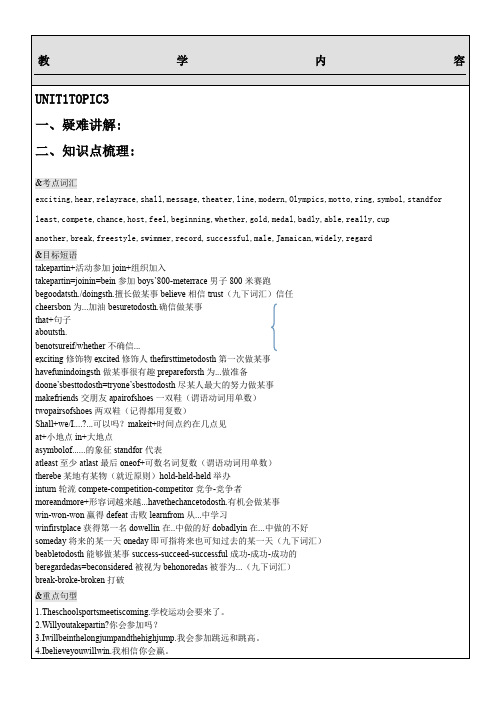
教学内容UNIT1TOPIC3一、疑难讲解:二、知识点梳理:&考点词汇exciting,hear,relayrace,shall,message,theater,line,modern,Olympics,motto,ring,symbol,standfor least,compete,chance,host,feel,beginning,whether,gold,medal,badly,able,really,cupanother,break,freestyle,swimmer,record,successful,male,Jamaican,widely,regard&目标短语takepartin+活动参加join+组织加入takepartin=joinin=bein参加boys’800-meterrace男子800米赛跑begoodatsth./doingsth.擅长做某事believe相信trust(九下词汇)信任cheersbon为...加油besuretodosth.确信做某事that+句子aboutsth.benotsureif/whether不确信...exciting修饰物excited修饰人thefirsttimetodosth第一次做某事havefunindoingsth做某事很有趣prepareforsth为...做准备doone’sbesttodosth=tryone’sbesttodosth尽某人最大的努力做某事makefriends交朋友apairofshoes一双鞋(谓语动词用单数)twopairsofshoes两双鞋(记得都用复数)Shall+we/I....?...可以吗?makeit+时间点约在几点见at+小地点in+大地点asymbolof......的象征standfor代表atleast至少atlast最后oneof+可数名词复数(谓语动词用单数)therebe某地有某物(就近原则)hold-held-held举办inturn轮流compete-competition-competitor竞争-竞争者moreandmore+形容词越来越...havethechancetodosth.有机会做某事win-won-won赢得defeat击败learnfrom从...中学习winfirstplace获得第一名dowellin在..中做的好dobadlyin在...中做的不好someday将来的某一天oneday即可指将来也可知过去的某一天(九下词汇)beabletodosth能够做某事success-succeed-successful成功-成功-成功的beregardedas=beconsidered被视为behonoredas被誉为...(九下词汇)break-broke-broken打破&重点句型1.Theschoolsportsmeetiscoming.学校运动会要来了。
中学英语词汇小结,高频词汇的用法及其相关短语词性转换

1.nice nicer/nicest1) have a nice / good /wonderful /great time= have fun = enjoy oneself(2.)be nice to sb(3) it’s nice of sb to doNice to meet /see you .(4)nice and +adj. = very +adj.2. meet v, 遇见会见met/met(1)meet sb at the +n (railway station/ airport)(2)meet with 偶遇,碰到meet with an accident.(遇到不测,失事)meet with difficulties(3)meet sb’s eyes 接触到某人的眼光4)meet one’s need 满足某人的需要5)have a meetinghave a sports/parent meetingat the meeting(6)meeting place会场3.family 指家要,家庭、House 居住的房屋Home 强调家里氛围环境a photo of my familyfamily member4. have v 有吃喝had hadhave /has got = have /hashave/take sth with sbhave/make/let sb dohave… to do (有。
要做)have a to of work to doHave sth done have one’s hair cutHave something/nothing to do with (与…有/无关系) 5.photo n. photos, take photos of …Take the photo with ..用…照相In the photo6.excuse v. 原谅/z/ n.借口/s/(名清动浊)(1)excuse meExcuse me for doing …= pardon sb for doing .. (2) make an excuse for …作为…的借口In excuse of …为…找借口/辩解In excuse of his failure he said he had been ill .他称病为自己的失败找借口7. help vt/n/vi. Helpful helpless helpfully (1)help do / to do sthHelp sb do /to do == Help sb with(2)can’t help doing = can’t stop doing(3)help oneself to +n(4)can I help you?=what can I do for you?(5.)help sb out 帮助..摆妥困境Help a lot/very much help each other Can’t help oneself 不能控制自己B, 名词ask sb for help =with one’s help= with the help ofWithout one’s helpC. be helpful to 。
英语口语天天练
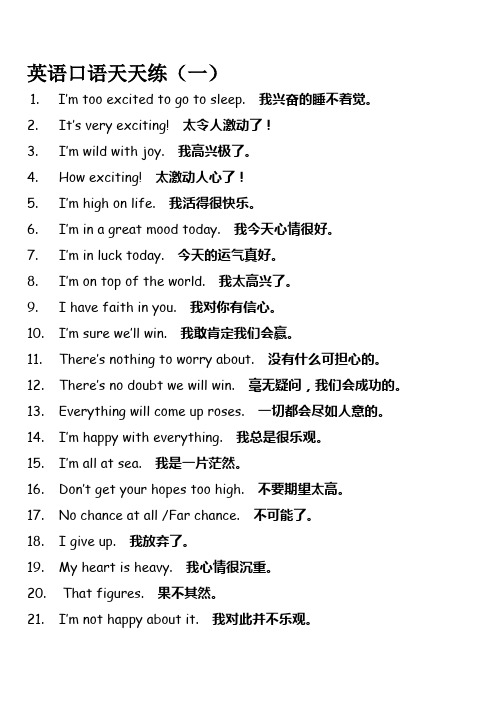
英语口语天天练(一)1.I’m too excited to go to sleep.我兴奋的睡不着觉。
2.It’s very exciting!太令人激动了!3.I’m wild with joy.我高兴极了。
4.How exciting! 太激动人心了!5.I’m high on life.我活得很快乐。
6.I’m in a great mood today.我今天心情很好。
7.I’m in luck today.今天的运气真好。
8.I’m on top of the world. 我太高兴了。
9.I have faith in you. 我对你有信心。
10.I’m sure we’ll win.我敢肯定我们会赢。
11.There’s nothing to worry about.没有什么可担心的。
12.There’s no doubt we will win.毫无疑问,我们会成功的。
13.Everything will come up roses. 一切都会尽如人意的。
14.I’m happy with everything. 我总是很乐观。
15.I’m all at sea.我是一片茫然。
16.Don’t get your hopes too high.不要期望太高。
17.No chance at all /Far chance. 不可能了。
18.I give up. 我放弃了。
19.My heart is heavy. 我心情很沉重。
20.That figures. 果不其然。
21.I’m not happy about it.我对此并不乐观。
22.No way. It’s hopeless.不可以,没希望了。
23.It’s the end of the world for me. 对我来说这简直是世界末日。
24.It’s fate.这是命中注定的。
25.Why are you feeling so depressed? 干嘛这么沮丧呢?26.That’s a shame.真遗憾。
关于think用法的几点注意事项(精)
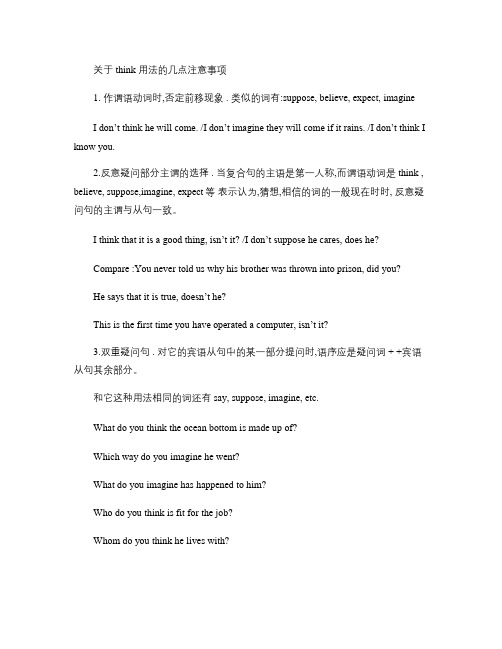
关于 think 用法的几点注意事项1. 作谓语动词时,否定前移现象 . 类似的词有:suppose, believe, expect, imagineI don’t think he will come. /I don’t imagine they will come if it rains. /I don’t think I know you.2.反意疑问部分主谓的选择 . 当复合句的主语是第一人称,而谓语动词是 think , believe, suppose,imagine, expect等表示认为,猜想,相信的词的一般现在时时, 反意疑问句的主谓与从句一致。
I think that it is a good thing, isn’t it? /I don’t suppose he cares, does he?Compare :You never told us why his brother was thrown into prison, did you?He says that it is true, doesn’t he?This is the first time you h ave operated a computer, isn’t it?3.双重疑问句 . 对它的宾语从句中的某一部分提问时,语序应是疑问词 + +宾语从句其余部分。
和它这种用法相同的词还有 say, suppose, imagine, etc.What do you think the ocean bottom is made up of?Which way do you imagine he went?What do you imagine has happened to him?Who do you think is fit for the job?Whom do you think he lives with?4、简单答语 . So 作代词时,可以作宾语,用在动词 think, hope, expect, suppose, imagine, believe 等的后面。
【英语】 状语从句易错题
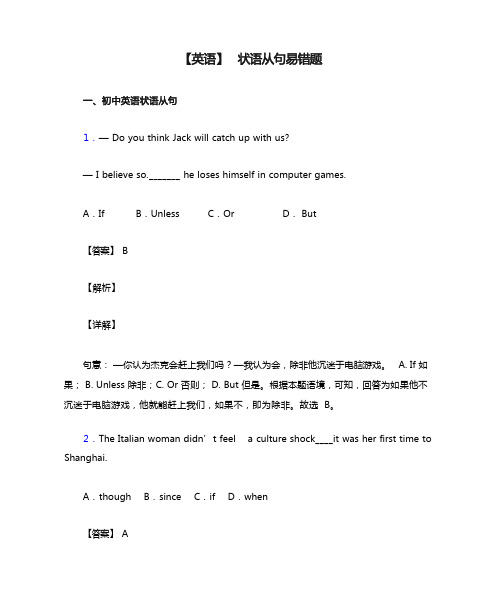
A1.— Do you think Jack will catch up with us?— I believe so._______ he loses himself in computer games.A.If B.Unless C.Or D. But【答案】 B【解析】【详解】句意:—你认为杰克会赶上我们吗 ? —我认为会,除非他沉迷于电脑游戏。
A. If 如果; B. Unless 除非;C. Or 否则; D. But 但是。
根据本题语境,可知,回答为如果他不沉迷于电脑游戏,他就能赶上我们,如果不,即为除非。
故选 B。
2.The Italian woman didn’t feel a culture shock____it was her first time to Shanghai.A.though B.since C.if D.when【答案】【解析】句意:这个意大利妇女没有感到一种文化冲击,尽管她是第一次来上海。
A. though 尽管; B. since 自从; C. if 是否,如果; D. when 当---时候;根据 The Italian woman didn’t feel a culture shock 这个意大利妇女没有感到一种文化冲击,和 it was her first time to Shanghai. 她是第一次来上海之间用 though 引导让步关系状语从句;故选 A3.—Tomwants toknow if you ___ a picnic next Sunday.—Y es. But if it ___ , we'll visit the museum instead.A.will have; will rain C.have; will rain B.have; rains D.will have; rains【答案】 D【解析】试题分析:句意:汤姆想知道下周你是否要去野餐。
动词think后的从句一定要否定前移吗
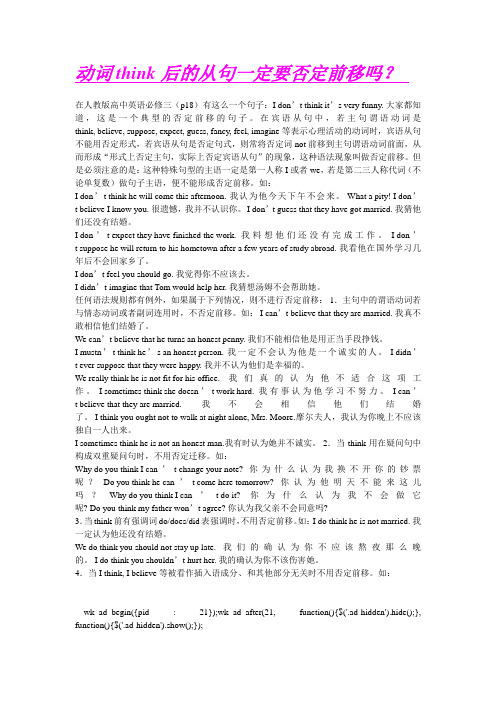
动词think后的从句一定要否定前移吗?在人教版高中英语必修三(p18)有这么一个句子:I don’t think it’s very funny. 大家都知道,这是一个典型的否定前移的句子。
在宾语从句中,若主句谓语动词是think, believe, suppose, expect, guess, fancy, feel, imagine等表示心理活动的动词时,宾语从句不能用否定形式,若宾语从句是否定句式,则常将否定词not前移到主句谓语动词前面,从而形成“形式上否定主句,实际上否定宾语从句”的现象,这种语法现象叫做否定前移。
但是必须注意的是:这种特殊句型的主语一定是第一人称I或者we,若是第二三人称代词(不论单复数)做句子主语,便不能形成否定前移。
如:I don’t think he will come this afternoon. 我认为他今天下午不会来。
What a pity! I don’t believe I know you. 很遗憾,我并不认识你。
I don’t guess that they have got married. 我猜他们还没有结婚。
I don’t expect they have finished the work. 我料想他们还没有完成工作。
I don’t suppose he will return to his hometown after a few years of study abroad. 我看他在国外学习几年后不会回家乡了。
I don’t feel you should go. 我觉得你不应该去。
I didn’t imagine that Tom would help her. 我猜想汤姆不会帮助她。
任何语法规则都有例外,如果属于下列情况,则不进行否定前移: 1.主句中的谓语动词若与情态动词或者副词连用时,不否定前移。
如: I can’t believe that they are married. 我真不敢相信他们结婚了。
(完整版)think,believe宾语从句的用法
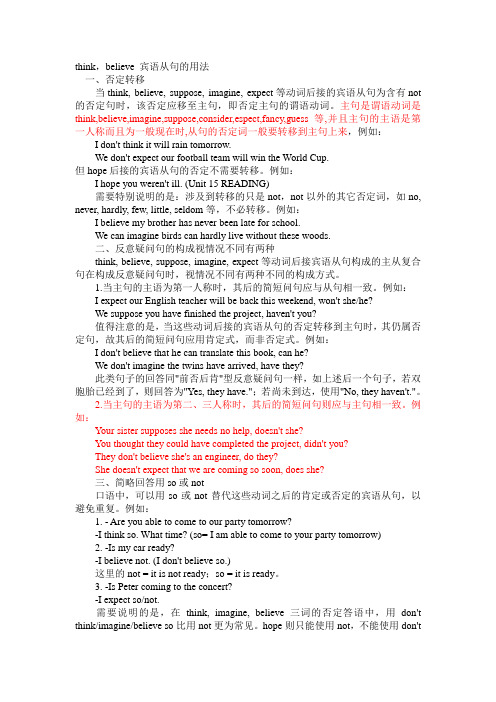
think,believe 宾语从句的用法一、否定转移当think, believe, suppose, imagine, expect等动词后接的宾语从句为含有not 的否定句时,该否定应移至主句,即否定主句的谓语动词。
主句是谓语动词是think,believe,imagine,suppose,consider,espect,fancy,guess等,并且主句的主语是第一人称而且为一般现在时,从句的否定词一般要转移到主句上来,例如:I don't think it will rain tomorrow.We don't expect our football team will win the World Cup.但hope后接的宾语从句的否定不需要转移。
例如:I hope you weren't ill. (Unit 15 READING)需要特别说明的是:涉及到转移的只是not,not以外的其它否定词,如no, never, hardly, few, little, seldom等,不必转移。
例如:I believe my brother has never been late for school.We can imagine birds can hardly live without these woods.二、反意疑问句的构成视情况不同有两种think, believe, suppose, imagine, expect等动词后接宾语从句构成的主从复合句在构成反意疑问句时,视情况不同有两种不同的构成方式。
1.当主句的主语为第一人称时,其后的简短问句应与从句相一致。
例如:I expect our English teacher will be back this weekend, won't she/he?We suppose you have finished the project, haven't you?值得注意的是,当这些动词后接的宾语从句的否定转移到主句时,其仍属否定句,故其后的简短问句应用肯定式,而非否定式。
广东金太阳高三英语模拟卷2023
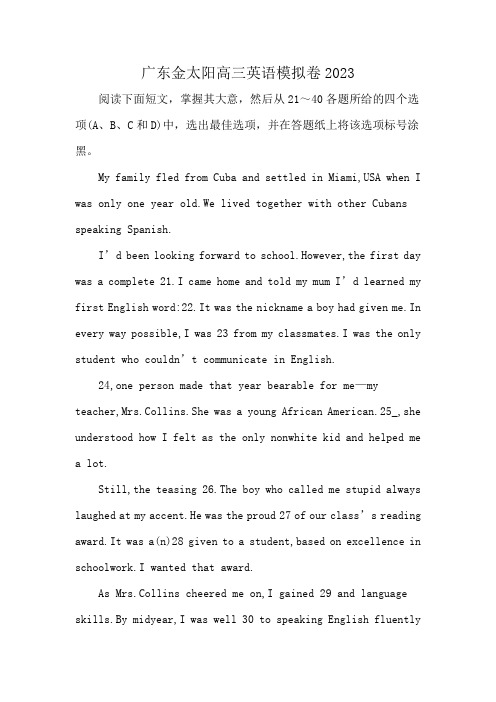
广东金太阳高三英语模拟卷2023 阅读下面短文,掌握其大意,然后从21~40各题所给的四个选项(A、B、C和D)中,选出最佳选项,并在答题纸上将该选项标号涂黑。
My family fled from Cuba and settled in Miami,USA when I was only one year old.We lived together with other Cubans speaking Spanish.I’d been looking forward to school.However,the first day was a complete 21.I came home and told my mum I’d learned my first English word:22.It was the nickname a boy had given me.In every way possible,I was 23 from my classmates.I was the only student who couldn’t communicate in English.24,one person made that year bearable for me—my teacher,Mrs.Collins.She was a young African American.25_,she understood how I felt as the only nonwhite kid and helped me a lot.Still,the teasing 26.The boy who called me stupid always laughed at my accent.He was the proud 27 of our class’s reading award.It was a(n)28 given to a student,based on excellence in schoolwork.I wanted that award.As Mrs.Collins cheered me on,I gained 29 and language skills.By midyear,I was well 30 to speaking English fluentlyand had a good grasp on reading.31 the approach of the award ceremony,I worked as hard as I could.The day32 came,and I was so nervous.When Mrs.Collins 33 me as the winner,it was my proudest moment.My winning caused a mini uproar(骚动).The mother of the boy who teased me 34 that the only non-native English speaker had taken the prize from her son.But in her 35,gentleway,Mrs.Collins stood her ground.It was an excellent lesson in fairness and never 36.From then on,I worked even harder in school,earning“A”s.As I began enjoying 37 as a singer years later,I always 38 Mrs.Collins in interviews when asked about people who had 39 me.I can’t tell you how many times the spirit has guided me through 40 in my life.21.A.shock B.puzzle C.mistake D.pleasure22.A.slow B.weak C.honest D.stupid23.A.set apart B.set off C.set down D.set about24.A.Surprisingly B.Happily C.Fortunately D.Wonderfully25.A.However B.Therefore C.Otherwise D.Anyhow26.A.appeared B.continued C.increased D.started27.A.holder B.follower C.supporter D.carrier28.A.gift B.honor C.treasure D.responsibility29.A.patience B.respect C.pride D.confidence30.A.on my way B.in my way C.by my way D.to my way31.A.For B.By C.With D.In32.A.suddenly B.hurriedly C.certainly D.finally33.A.permitted B.introduced C.announced D.admitted34.A.explained B.realized plained D.told35.A.weak B.light C.warm D.strong36.A.cheering up B.giving up C.turning up D.holding up37.A.courage B.independence C.success D.support38.A.requested B.noticed C.reminded D.mentioned39.A.confused B.impressed C.taught D.inspired40.A.chances B.choices C.challenges petitions第三部分阅读理解(第一节20小题,第二节5小题;每小题2分,满分50分)第一节:阅读下列短文,从每题所给的四个选项(A、B、C和D)中,选出最佳选项,并在答题卡上将该选项标号涂黑。
学考优化指导2021年高中英语Unit4MakingthenewsSectionⅠWarmingUp

典句欣赏 1.In fact,whether you’re at school or university,there are many
opportunities to get involved in media. 事实上,无论你在学校还是大学,都有很多机会参与媒体。 2.It’s a challenge,but it is a great way to learn. 虽然是一个挑战,但这是一个学习的好方法。
In the digital age,it’s also worthwhile to work on a website— perhaps that of your university publication,or a university society.You’ll gain knowledge publishing platforms such as WordPress.
If your university’s student magazine isn’t for you,or you want to do something different,consider starting your own.It’s a
challenge,but it is a great way to learn.
d.need
5.depend on
e.in order to
6.demand
f.to help;to aid
7.accuse...of
g.to focus on
8.assist
h.to charge...with
答案:1.c 2.e 3.a 4.g 5.b 6.d 7.h 8.f
二、短语识义
1.accuse...of 因……指责或控告…… 2.concentrate on 集中;全神贯注于 3.so as to (do sth.) 为了(做某事) 4.depend on 依靠;依赖
用so,not替代的省略现象
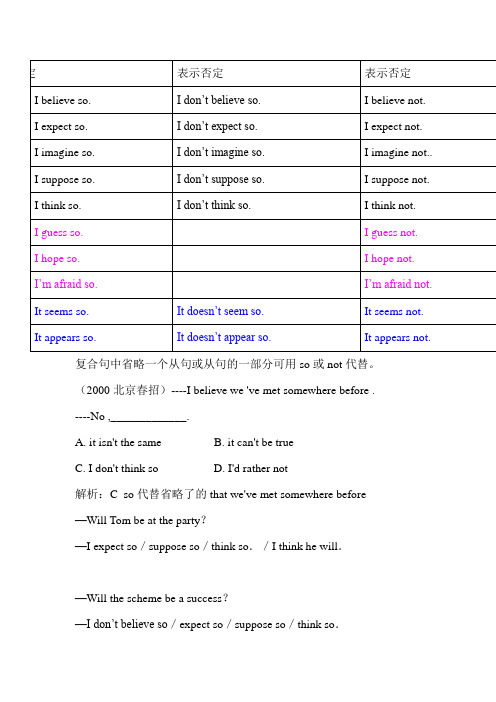
复合句中省略一个从句或从句的一部分可用so 或not 代替。
(2000北京春招)----I believe we 've met somewhere before . ----No ,_____________.A. it isn't the sameB. it can't be trueC. I don't think soD. I'd rather not解析:C so 代替省略了的that we've met somewhere before —Will Tom be at the party?—I expect so/suppose so/think so./I think he will.—Will the scheme be a success?—I don’t believe so/expect so/suppose so/think so.—Are they making good progress?—It doesn’t seem so.—It won’t take long,will it?—No,I suppose not./I don’t suppose so.—The plane didn’t land i n Calcutta,did it?—I believe not./I don’t believe so.—Is Peter coming with us?—I hope so.—Will you have to pay duty on this?—I’m afraid so.—Have you got a work permit?—I’m afraid not.2. 在say和tell+宾语之后可用so和not:—How do you know there is going to be a demonstration?—Jack said so./Jack told me so.—要举行示威游行的事你是怎么知道的?—是杰克说的。
I think 讲解
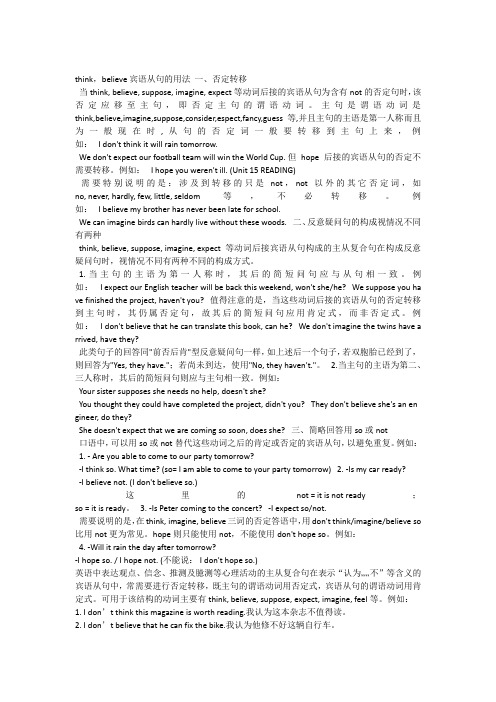
think,believe 宾语从句的用法一、否定转移当think, believe, suppose, imagine, expect等动词后接的宾语从句为含有not的否定句时,该否定应移至主句,即否定主句的谓语动词。
主句是谓语动词是think,believe,imagine,suppose,consider,espect,fancy,guess等,并且主句的主语是第一人称而且为一般现在时,从句的否定词一般要转移到主句上来,例如: I don't think it will rain tomorrow.We don't expect our football team will win the World Cup. 但hope后接的宾语从句的否定不需要转移。
例如: I hope you weren't ill. (Unit 15 READING)需要特别说明的是:涉及到转移的只是not,not以外的其它否定词,如no, never, hardly, few, little, seldom等,不必转移。
例如: I believe my brother has never been late for school.We can imagine birds can hardly live without these woods. 二、反意疑问句的构成视情况不同有两种think, believe, suppose, imagine, expect等动词后接宾语从句构成的主从复合句在构成反意疑问句时,视情况不同有两种不同的构成方式。
1.当主句的主语为第一人称时,其后的简短问句应与从句相一致。
例如: I expect our English teacher will be back this weekend, won't she/he? We suppose you ha ve finished the project, haven't you? 值得注意的是,当这些动词后接的宾语从句的否定转移到主句时,其仍属否定句,故其后的简短问句应用肯定式,而非否定式。
Think后的句子一定要否定转移吗
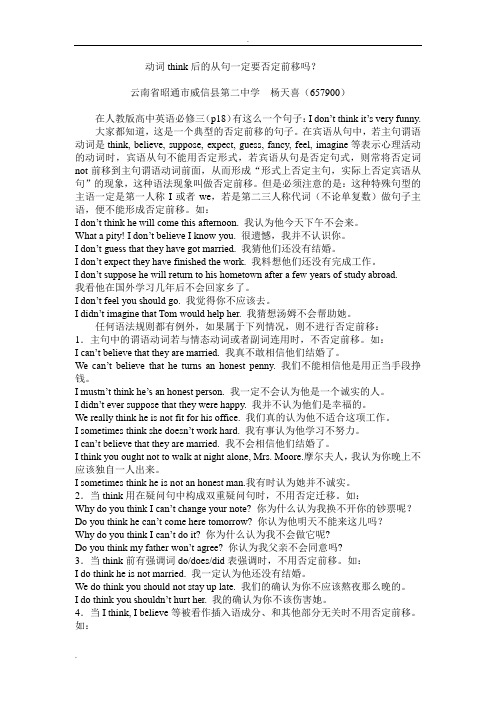
动词think后的从句一定要否定前移吗?云南省昭通市威信县第二中学杨天喜(657900)在人教版高中英语必修三(p18)有这么一个句子:I don’t think it’s very funny.大家都知道,这是一个典型的否定前移的句子。
在宾语从句中,若主句谓语动词是think, believe, suppose, expect, guess, fancy, feel, imagine等表示心理活动的动词时,宾语从句不能用否定形式,若宾语从句是否定句式,则常将否定词not前移到主句谓语动词前面,从而形成“形式上否定主句,实际上否定宾语从句”的现象,这种语法现象叫做否定前移。
但是必须注意的是:这种特殊句型的主语一定是第一人称I或者we,若是第二三人称代词(不论单复数)做句子主语,便不能形成否定前移。
如:I don’t think he will come this afternoon.我认为他今天下午不会来。
What a pity! I don’t believe I know you. 很遗憾,我并不认识你。
I don’t guess that they have got married. 我猜他们还没有结婚。
I don’t expect they have finished the work.我料想他们还没有完成工作。
I don’t suppose he will return to his hometown after a few years of study abroad.我看他在国外学习几年后不会回家乡了。
I don’t feel you should go.我觉得你不应该去。
I didn’t imagine that Tom would help her.我猜想汤姆不会帮助她。
任何语法规则都有例外,如果属于下列情况,则不进行否定前移:1.主句中的谓语动词若与情态动词或者副词连用时,不否定前移。
英文中陈述自己观点的句子

英语辩论赛常用句式一陈述观点(stating an opinion)In my opinion 我的意见是Personally I think 我个人认为I believe/think that 我相信,我认为The point is that 我的观点就是As far as I am concerned ... 就我而言...in my experience...根据我的经验......From where I stand 从我的立场看来二同意观点(agree an opinion)I agree completely. 我完全赞同I agree with you entirely.我完全同意你所说的。
You’re absolutely right.显然你是对的。
That’s a good point.这个看法不错。
I couldn’t agree with you more.我绝对赞成你。
That’s just what I think.我就是那样认为的。
I feel the same way.我也持同样的想法。
三反对意见(disagreeing with an opinion)......however,......然而......I’m afraid i disagree.恐怕我是持反对意见的。
I don’t think so.我不那样认为。
I don’t think…我认为……不是那样的。
on the contrary. 相反的。
That’s not (entirely)true. 那不(完全)正确。
I can’t possibly agree with you.我不可能同意你。
I hate to disagree with you,but......我不喜欢反对你,但......All right,but don’t you think......?好吧,但难道你不觉得......But that’s different.但那是不一样的。
常用英语口语小技巧

常用英语口语小技巧常用英语口语小技巧常用口语:肯定Are you Ms. Tanaka?Yes, I am. /Oh, yes! /Oh, yeah! *很肯定No, I'm not.Do you like movies? --Yeah.*随意Is John off today?I think so. 我想是吧 /believe so. /So they say. /So I understand. /I suppose so. /To my understanding.You're from Canada, right?Right. /That's right. /Yes. /Correct. /That's correct. /You're correct. /That's true.Wrong.Is that right?Absolutely! 一点儿没错!Do you want to go?Absolutely! /Definitely. /That's it exactly. /Exactly.Not exactly. 未必/不全是Is it true? --In a word, yes. /Absolutely.What do you think?You're perfectly correct.我觉得你说的很对You're quite right. / You're exactly right.You're absolutely correct.In a sense he's right.Let's push this button.That's it! 啊,对啦!Let's try this way. --That's it!That's a winner. /Sounds like a winner.That's not it. 啊,学英语的好网站,不对。
英语句法——常见习惯用语
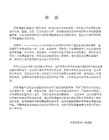
常见习惯用语(一) 知识概要由于英语国家的语言习惯与中国的语言习惯有许多不同之处,所以造成了许多同学在做选择或书写,或与人交谈中造成误用中国方式来对英语的问句作解答。
例如一个小女孩十分好看,可爱,外国人见到时会讲: You are so beautiful 这时的答语应该是 Thank you 如果外国人发现你的英语不错,他们会讲: Your English is very good 这时中国人常常会说:不,我说的不好。
这纯是一种礼貌的答语,但是不符合英语习惯。
它正确的答语应是 Thank you 虽然交际英语有一些规律可讲,但更重要的是学习外国的生活习惯,了解他们的文化背景,历史渊源,这样才能真正的学好一门外语。
(二) 正误辨析[误] - What can I do for you?- Yes , please help me[正] - What can I do for you? - I'd like to buy a sweater[析] What can I do for you? 这一问语实际上用于的情景很多,要根据具体情况而定。
如在商店中售货员讲这句话应译为:您想要点什么?在其他场合也可以被译为:我能为您做些什么?它的答语应是直接讲出想让对方提供的帮助。
[误] - Which colour do you like?- Sorry , I don't like[正] - Which colour do you like?- I prefer blue[析] 由 which 来提问的问句是要回答具体的选择,而不能泛指,泛泛的回答。
如 Yes , I like it[误] Do you like to come with us tonight?[正] Would you like to come with us tonight?[析] Do you like … 问的是对方的习惯,如: Do you like swimming? Do you like collecting stamps? 而 would you like … 则是一次性的邀请、提议。
so和such用法小结

so和such用法小结一,so的常见用法1.当so作副词,修饰形容词或副词时,表示程度,意为"这么","那么".如:Don' t be so silly.别那么傻.He ran so fast.他跑得那么快.2.如果so后无形容词,则so不能与名词连用.如:I' ve never seen so tall a child(=such a tall child).我从未见过个儿那么高的小孩.切不可以说"He is so a child."但是,so little,so much可与不可数名词连用,so few,so many可与复数名词连用如: Tom ate so much food a meal.汤姆一餐吃了那么多的食物.There' re so few people in the hall.大厅里的人很少.3.So…that 意为"如此……以至于……",是一个常见句型,也是中考常考的句型.如:J ane' s leg was so painful that she couldn' t move at all.简的腿那么疼,以至于根本动不了.该句型还可以转换成"So + adj.+ a/an+名词"结构.如:Mike is so clever a boy that all like him.麦克这么聪明,大家都喜欢他.so that意为"以便","为的是",引导目的状语从句(该目的状语通常用情态动词作谓语)如:They can help you to pare two different products so that you can buy the one you really like.他们能帮助你比较两种不同的产品,以便你能买到自己真正喜欢的.so that从句还可表示结果,意为"因此", 如:His pen is missing,so that he hasn' t done his homework.他的笔不见了,因此他无法完成作业.4.so与动词say,tell,think,believe,suppose等连用,可以替代一个意义完整的宾语从句.如:Is she a top student in her class Yes,I think so.她是她们班最好的学生吗是的,我想是这样.so与动词do连用,意为"这样做",以避免重复前面的有关容.而if so意为"如果是这样".如:He did so in order to help her.他这样做是为了帮助她.Are you a student If so(=If you are ),may I have your name,please你是学生吗如果是,请问你叫什么名字5."So + be/其他助动词/情态动词+ 主语"是倒装结构,意为"同样","也".这一结构在中考试题中也经常出现.如:—I usually go to bed at night.—So do I.—我通常晚上睡觉.—我也是.6.so作连词,表示结果,意为"所以","因此".如:—How do you like this shirt—It' s beautiful and it fits me well,so (that) I 1ike it very much.—你喜欢这件衬衣吗—它既漂亮又很合身,因此我非常喜欢.7."not so +adj./adv.(原级)+as"是一个常见的比较级句型,也是中考常考的句型,意思是"不如","不及".如:The man doesn' t work so hard as me.这个人工作不如我努力.二,such的常见用法1.such是限定词,常和名词连用,意为"如此的","这样的".如:She is such a kind woman.她是一个如此善良的女人.Grandpa often told us such funny stories.爷爷常给我们讲这么有趣的故事.Don't go out in such bad weather.天气这么糟,不要出去区别:so是副词,修饰形容词和副词,在句中充当状语.Such为形容词修饰名词,在句中作定语,请看下面几个句子.①The fish is so long.②Don't drive so fast, it's dangerous.③Fred is so good a man.Fred is such a good man.④It was such interesting meeting.The meeting was so intersting.⑤There were such a lot of people. There were so many people.以上句子中,①,②句比较简单,so为副词,分别修饰形容词long和副词fast.③句中的so修饰good,可用形容词such改为:Fred is such a good man.这句话和原句的意义不变,但用so要用so+adj+a/an+n.的结构来表达.用such需用such+a/an+adj+n.的结构来表达.④句中仍可按③的形式表达,但也可写成:The meeting was so interesting.其句意不变.⑤句中的such也可换为so,但更据习惯搭配,应将a lot of 变为many 为宜,如其后所修析的名词为不可数名词,还需将a lot of改为much.如:With such a lot of time,they should have finished their homework用so则为:With so much time, they so have finished their homework.因此遇到这种情况,我们可将such+a lot of+n.结构变为so+many/much+n.结构再看这样一个句子:The enemy scattered in such a hurry.可改为:The enemy scattered so hurriedly.又如:The plane flies at such a speed.则可写成:The plane flies so fast.这样的句子为such+a/an+n结构,改为so+adv结构其义不变. 在so……that—clause中和such……that---clause中,我们也可参照以上的结构来进行转换.1、so + 形容词/副词+ that + 从句,如:This story is so interesting that I want to read it again. (这个故事如此有趣以至我想再读一次。
- 1、下载文档前请自行甄别文档内容的完整性,平台不提供额外的编辑、内容补充、找答案等附加服务。
- 2、"仅部分预览"的文档,不可在线预览部分如存在完整性等问题,可反馈申请退款(可完整预览的文档不适用该条件!)。
- 3、如文档侵犯您的权益,请联系客服反馈,我们会尽快为您处理(人工客服工作时间:9:00-18:30)。
Part III
常用句型
Page 2
2. I think so. 我认为如此。
【注】so 常用在 think, believe, expect, suppose之后 , 代 替 上 文 提 到 的 肯 定 结 构 内 容 , 我 们 可 以 说 I think / believe / expect / suppose so;如果要代替上文提到的否定 结构内容时,可以说成I don't think / believe / expect /ve / expect / suppose not. 【注】so 用在 hope, be afraid之后,也可以代替上文提 到的肯定结构内容,我们可以说I hope / am afraid so;如果 要代替上文提到的否定结构内容,我们只能说成I hope not. / I'm afraid not.
5.- Nothing serious, I hope. -I B . A. don't hope B. hope not C. hope so D. don't hope so 6.- Do you think it will rain tomorrow? - A . It hasn't rained for a whole month. It's too dry. A. I hope so B. I hope not C. I'm sure it will D. I'm afraid it will 7.- Is Mr. Smith really very ill? - D . He's in hospital. A. I don't think so B. No, he isn't. C. I hope so D. I'm afraid so 8.- I believe we've met before. - No, C . I've never been here before. A. it isn't the same B. it's true C. I don't think so D. I believe so
中考连线
1.-Will you be able to come to the party? -I B . A. believe yes B. am afraid not C. don't hope so D. don't expect 2.- I fell off my bike. I think my arm is broken. - Oh! I D . A. do not hope so B. do not hope C. hope not so D. hope not 3.- Do you think it's going to rain on weekend? - D . A. I don't believe B. I don't believe it C. I believe not so D. I believe not 4.- Will you be able to finish the job this week? - D . A. I can't say so B. I'm not sure so C. I don't know so D. I don't expect so
